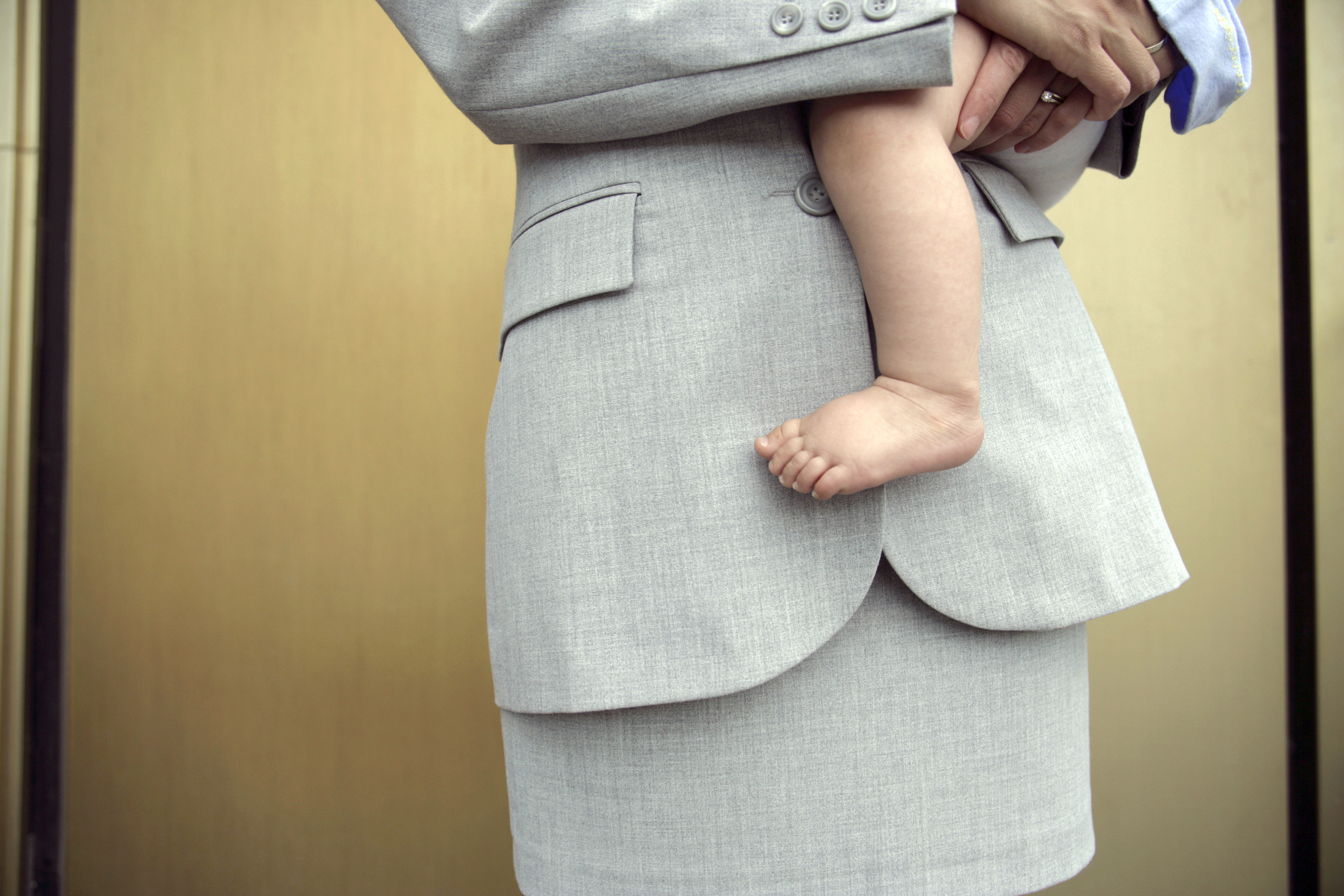Swiss mothers hold back from having it all

The problem of how women reconcile the demands of a top career and child-rearing was a talking point this summer after a United States high-flyer declared most women cannot do both. Echoes of the debate have also been heard in Switzerland.
Respect, power, influence and a family to boot – to the outside world Anne-Marie Slaughter, a former policy planning director for Secretary of State Hillary Clinton, had it all. What she didn’t have was time to spend with her family, something women in Switzerland have in relative abundance.
Writing in the US magazine The Atlantic in July, Slaughter called for a fundamental change in the way work is organised – more freedom to work off site, working hours that correspond to school hours and shifting the peak productivity years away from the peak parenting years.
In a later syndicated follow-up piece printed in the Swiss press, Slaughter said she was surprised by the enormous response to her article. (The original essay, “Why women still can’t have it all”, has had over a million hits and been republished in various countries and Slaughter has been interviewed by journalists worldwide.)
“The reactions varied by country,” she wrote. “The article is a test of where individual countries stand in their respective progress to achieve full equality between men and women.”
Among the press coverage in Switzerland, the Tages-Anzeiger newspaper noted that while the debate was in full swing in the US, in Europe it was also “explosive material … addressing the Achilles’ Heel of feminism – motherhood”. Meanwhile the NZZ am Sonntag said it did not move the debate forward as neither sex really “had it all” anyway.
Culture change
Part-time work is the norm in Switzerland for mothers in employment. Sixty-one per cent of women with children under 25 choose this arrangement. Almost one in four are stay-at-home mothers, while only 16 per cent work full-time.
But how free are these choices? Are women jumping into the part-time model or are they being pushed?
Swiss political scientist Regula Stämpfli has no doubt the barriers are external. “I always find this choice debate really ridiculous, the idea that women put up the barriers themselves. Because we really don’t have a choice, we don’t have a viable work model, neither for women nor for men.”
In her essay, Slaughter wrote that men need to be enlisted to share the home burden more. Currently only 7.6 per cent of Swiss fathers work part-time.
A laudable goal, according to Stämpfli. “In the long term we really have to have great discussions about families, motherhood, fatherhood and the labour market and how we organise our societies.”
Paradoxically while Slaughter gave up her position of power, she argues that more women in power is what is needed to reshape society for the better.
“Only when women wield power in significant numbers will we create a society that genuinely works for all women … that will be a society that works for everyone.”
Stämpfli finds it regrettable that women have to behave like men, in terms of time schedule and commitment to family, to get to a position of power.
As the only woman political columnist in German-speaking Switzerland, she is sceptical about the extent of women’s true influence in the country.
“The more power an institution has the fewer women you have. Look at the banks, the media, the editors-in-chief.”
Women on top
However, women have visibly reached the top in Swiss politics, with three female ministers in the current seven-member cabinet.
In parliament, the figures are less impressive but still respectable in a country where women have only had the vote for 40 years. Twenty-nine per cent of House of Representatives seats are held by women, compared to 19 per cent of the Senate.
But things look much less even in the business world where women are still not breaking through to senior management in reasonable numbers.
In 2010 just four per cent of senior executive positions were held by women, and women made up 8.3 per cent of company boards. These figures haven’t moved much in over a decade according to the State Secretariat for Economic Affairs (Seco).
This despite the fact that the debate around gender diversity within senior management teams has shifted from an issue of fairness and equality to a question of superior performance.
Stocks of companies with at least one woman on the board outperformed those of their peers with no women on the board by 26 per cent over the course of the last six years, a recent Credit Suisse Research Institute Report found.
In 2011 Seco issued a set of good practices to encourage firms to appoint more women to top positions, with the support of two employers’ associations. But as yet there is a lack of political will to introduce female quotas.
Childcare role
Swiss society still places a high value on women’s role in caring for their children, as illustrated by divorce settlement guidelines.
Under a Swiss Supreme Court ruling, women who aren’t in paid employment at the time of their divorce can insist on continuing to stay at home to look after their child or children until the youngest is ten. Before then they cannot be obliged to work, even part-time.
These are the guidelines judges refer to when deciding who should generate the family’s income. Only when the youngest child reaches of the age of 16 is a divorced mother expected to work full-time.
It is notoriously difficult to catch up in salary and seniority when returning to full-time work after an absence of several years or an extended period of working part-time, and not only because of time missed.
Women earn on average 20 per cent less than men in Switzerland and women executives earn up to 30 per cent less than men. Around 40 per cent of this difference comes from discrimination, according to the Federal Equality Office.
“Even my generation who were absolutely certain that we would earn more than the guys who studied with us are nowhere close,” Stämpfli commented. “We may end up with a nice careers but it’s nothing to what some of our colleagues, not half as talented as us, have managed.”
What prompted Slaughter to write a lengthy essay justifying her position was the less-than-sympathetic response she got from some women to her decision to resign from her job as foreign policy advisor at the US State Department.
The cover article ‘Why women still can’t have it all’ appeared in the July/August issue of The Atlantic. It sparked a massive debate in social and traditional media worldwide.
Slaughter, who returned to her position as a professor at Princeton University, acknowledged that her high-achieving credentials set her apart from the struggles of the average woman.
Before she had her epiphany, Slaughter had followed her ambition quite a distance. She was working in Washington and living hundreds of miles away from her children (aged 14 and 12), only seeing them at weekends.
Key Slaughter quotes: “The women who have managed to be both mothers and top professionals are superhuman, rich, or self-employed.”
“I’d been part, albeit unwittingly, of making millions of women feel that they are to blame if they cannot manage to rise up the ladder as fast as men and also have a family and an active home life.”
A study of 1,100 professionals with working experience in Switzerland was carried out in 2011 by George Washington University, with support from the US Embassy in Bern. 85% of respondents were women. 70% had Bachelor’s degrees.
Highlights:
79% of women believe gender is a factor in career advancement and just over half of men agree.
73% of women say there are barriers to women advancing in upper management in Switzerland.
61% of men do not agree.
Both sexes agree that men should be entitled to paternity leave, but they disagree over whether the 14-week statutory maternity leave, among the shortest in Europe, should be extended.
18% of men say parenthood is a career setback, but only 3% of women see fatherhood as a career detriment.
89% of women and two-thirds of men say having children negatively affects a woman’s career.
86% of respondents say school schedules should be changed to suit working parents.
89% of men and 54% of women reject a quota system for placing women in boardrooms.

In compliance with the JTI standards
More: SWI swissinfo.ch certified by the Journalism Trust Initiative



You can find an overview of ongoing debates with our journalists here. Please join us!
If you want to start a conversation about a topic raised in this article or want to report factual errors, email us at english@swissinfo.ch.